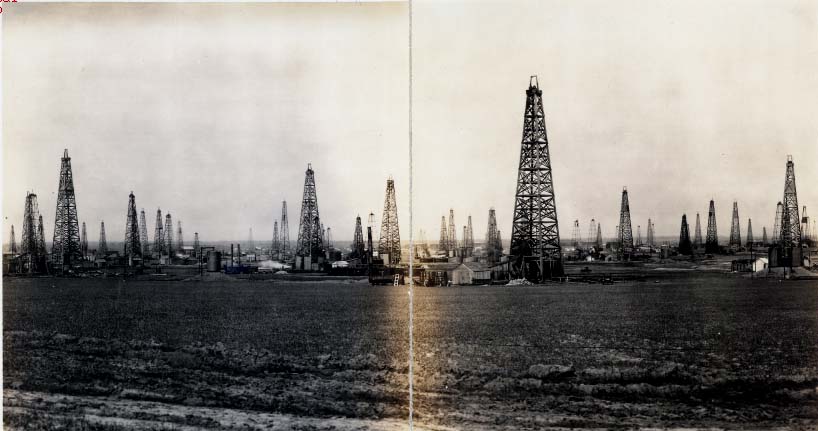The Encyclopedia of Oklahoma History and Culture
MARLAND OIL COMPANY.
The Marland Oil Company, which existed from 1921 until 1928, assumed an almost legendary reputation in Oklahoma, due largely to the activities of its flamboyant founder, Ernest Whitworth Marland. Marland arrived in Oklahoma from Pennsylvania late in 1908 and immediately entered the oil business. With a group of local investors he formed the 101 Ranch Oil Company and began drilling on the famous 101 Ranch property in Kay County. By June 1911 those activities produced the company's first big discovery. This precipitated a rapid expansion into natural gas production, the company's major focus.
From the outset Marland realized that to sustain long-range corporate growth he must form an integrated company encompassing drilling and production, storage and transportation, and refining, and retailing, similar to the very successful model used by the Standard Oil Company. The first step in this process was to dissolve the 101 Ranch Oil Company and replace it with the Marland Refining Company. Over the next several years Marland expanded his empire to include production in neighboring states, and by 1919 he had even started large-scale drilling operations in Mexico.
The next step in bringing the feverish rate of growth under a more centralized and integrated operation came in early 1921 when Marland consolidated all of his oil operations under the auspices of the Marland Oil Company. Headquartered in Ponca City, where its major refining facility was located, the firm continued its phenomenal growth pattern by absorbing numerous small oil companies such as Comar Oil Company, Tom Jones Oil Company, Kenney-Cleary Oil Company, Francoma Oil Company, John S. Alcorn Oil Company, and many others whose highly competent executives Marland's company usually retained. Additionally, the company opened its first retail gasoline "filling station," in Pawhuska, Oklahoma, in 1920, and that aspect of the business began to experience rapid growth.
Marland took a strong, paternal interest in his company and in his employees and provided numerous benefits not normally offered in that era. He furnished company housing at a nominal fee, provided free insurance to all employees, paid wages above the norm for the time, and is generally acknowledged to have provided the best employee benefits and working conditions in the state. Additionally, his donations to local charities and civic projects were enormous, and he sponsored legendary entertainment spectacles for both employees and the general public.
The feverish pace of expansion continued in the early 1920s. The company logo, a red triangle with "Marland" emblazoned on it, became a familiar sight across Oklahoma and surrounding states. Determined to expand even further, in 1923 Marland secured large-scale financial backing from the J. P. Morgan Company banking interests in New York City. This influx of capital increased the tempo of expansion until by 1926 the Marland Oil Company could boast of oil production in excess of 1.3 million barrels from operations in Texas, New Mexico, Colorado, Wyoming, Kansas, and California. At the same time, the company had more than six hundred service stations in eleven states and product distributors in every state in the union as well as in seventeen foreign countries.
During this period of Marland Oil's unparalleled growth and expansion, J. P. Morgan and his company gained more and more control over E. W. Marland's affairs. On numerous occasions they stopped him when he broached some new and flamboyant scheme. By 1928 there was a slump in the oil business, Marland found that he was overextended, and the bankers assumed control of his company. They ousted him, put in their own management team, downsized the company, and absorbed it into the Continental Oil Company, or Conoco. By mid-1929 all of the Marland red triangle signs had been painted over with Conoco emblems, and the Marland Oil Company was no more.
See Also
CITIES SERVICE COMPANY, PETROLEUM INDUSTRY, SINCLAIR OIL AND REFINING CORPORATION, WILLIAM GROVE SKELLY, WARREN PETROLEUM COMPANY
Learn More
Michael W. Everman, "Ernest Whitworth Marland: Governor of Oklahoma, 1935–1939," in Oklahoma's Governors, 1929–1955: Depression to Prosperity, ed. LeRoy H. Fischer (Oklahoma City: Oklahoma Historical Society, 1983).
John Joseph Mathews, Life and Death of an Oilman: The Career of E. W. Marland (Norman: University of Oklahoma Press, 1951).
Ernest Whitworth Marland, My Experience With the Money Trust (Enid, Okla.: Enid Press, 1932).
Citation
The following (as per The Chicago Manual of Style, 17th edition) is the preferred citation for articles:
Bobby D. Weaver, “Marland Oil Company,” The Encyclopedia of Oklahoma History and Culture, https://www.okhistory.org/publications/enc/entry?entry=MA026.
Published January 15, 2010
© Oklahoma Historical Society



